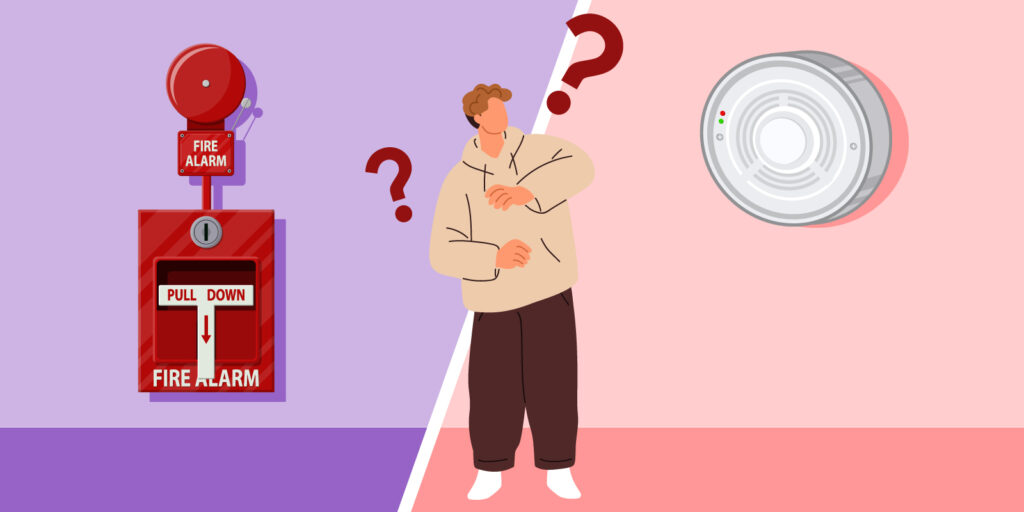Fire alarms and smoke detectors are devices that are used to detect the presence of fire and alert people to evacuate a building. The history of these devices goes back to the early days of firefighting when people would use bells, horns, or other loud noises to alert others to a fire.
In the 19th century, many cities began installing fire alarm systems that used telegraph wires to quickly alert fire stations to the location of a fire. Smoke detectors, on the other hand, were not invented until the 20th century. The first smoke detector was invented in 1890 by Francis Robbins Upton, but it was not practical for widespread use. It was not until the 1950s that the first reliable and affordable smoke detectors were developed, and they quickly became a common feature in homes and buildings.
Today, fire alarms and smoke detectors are an essential part of fire safety and are required by law in many places. Do you know the difference between a fire alarm vs smoke detectors and which one you should have on hand? Keep reading to learn more.
Fire Alarm vs Smoke Detector
Fire alarms and smoke detectors are two different types of devices that are designed to detect different things in a building.
Fire Alarms
A fire alarm is a system that is designed to detect the presence of a fire and alert people in the building so that they can evacuate. This is typically done using a network of sensors placed throughout the building and connected to a central control panel. When the sensors detect a fire, they send a signal to the control panel, which then triggers the alarm to sound.
Smoke Detector
On the other hand, a smoke detector is designed specifically to detect the presence of smoke in the air. This is typically done using a small sensor that is placed in the ceiling or on a wall. When the sensor detects smoke, it will trigger an alarm to sound, alerting people in the building to the presence of a potential fire.
Do You Need Both a Fire Alarm and a Smoke Detector?

In most cases, it is recommended to have both fire alarms and smoke detectors in a building. While smoke detectors are designed to detect the presence of smoke, which can be an early indication of a fire, they are not as comprehensive as fire alarms. Fire alarms are a more advanced system that is designed to detect a wider range of fire-related hazards, such as carbon monoxide or natural gas leaks.
Having both types of systems in a building can provide an added layer of protection and increase the chances of detecting a problem early on and evacuating.
It is also important to note that different buildings may have different requirements for fire safety systems. For example, some buildings may be required by law to have a certain number of smoke detectors or fire alarms or may have specific requirements for where these devices should be placed. Be sure to check with your local fire department or building codes to determine what is required for your particular building.
Home Safety
In most cases, it is recommended to have smoke detectors on every level of your home, including the basement and in every bedroom. In addition to regular maintenance of your alarm or detector, be sure to make an escape plan and discuss it with your family in case a fire were to break out in your home.
Maintaining Your Fire Alarm
Fire alarms are subject to aging. Therefore, you should plan on routine checks to ensure everything is working properly. This typically involves testing the system monthly to make sure the alarms are sounding and replacing the batteries or other power sources at least once a year.
Testing Your Fire Alarm
To test your fire alarm system, simply activate the test mode on the control panel or use a test button or key on a remote control or smoke detector. This will cause the alarm to sound, indicating that the system is working properly. If the alarm does not sound, or if it sounds weak, it may be time to replace the batteries or other power sources or to have the system serviced by a professional.
Cleaning Your Fire Alarm
In addition to testing your fire alarm system on a regular basis, it is also a good idea to clean the components of the system, such as the control panel, sensors, and alarms. This can help to remove any dust or debris that may have accumulated on the components, which can affect their ability to function properly. To clean your fire alarm system, simply use a soft brush or vacuum attachment to gently remove any dust or debris from the components.
Check the Expiration Date
It is also important to check the expiration date of your fire alarm system. Most fire alarm systems have a lifespan of about ten years, after which they should be replaced. If your fire alarm system is older than ten years, it is a good idea to replace it with a new one to ensure that it is functioning properly.
Maintaining Your Smoke Detector
Regularly testing and maintaining your smoke detectors to ensure that they are working properly is equally as important. This process also involves testing the devices monthly to ensure the alarms are sounding and replacing the batteries at least once a year.
Testing your Smoke Detector
To test your smoke detectors, simply press the test button on the device. This will cause the alarm to sound, indicating that the device is working properly. If the alarm does not sound, or if it sounds weak, it may be time to replace the batteries or the entire smoke detector.
Cleaning your Smoke Detector
In addition to testing your smoke detectors on a regular basis, it is also a good idea to clean them periodically. This can help to remove any dust or debris that may have accumulated on the sensors, which can affect their ability to detect smoke. To clean your smoke detectors, simply use a soft brush or vacuum attachment to gently remove any dust or debris from the sensors and the surrounding areas.
Check The Expiration Date
Just like your fire alarm, your smoke detector has a lifespan of about ten years. As you’re inspecting, check the expiration date to see if your smoke detector needs to be replaced.
Safety First
Fire alarms and smoke detectors are an essential part of fire safety and are required by law in many places. You don’t want to wait until a fire to find out something isn’t working, so it’s important to regularly test and maintain both smoke detectors and fire alarms to ensure that they are working properly and can provide the protection you need in case of a fire. Finally, make sure to check your local state guidelines, so you are up to code.
You might also be interested in: 10 Ways Space Heaters Can Catch On Fire




